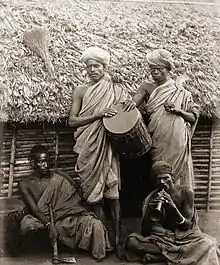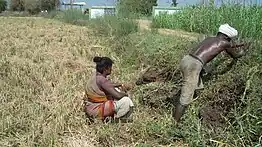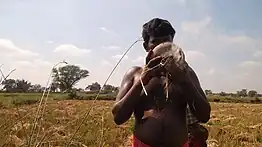Irula people
Irula, also known as Iruliga, are a Dravidian ethnic group inhabiting the Indian states of Tamil Nadu, Kerala and Karnataka.[2] A scheduled tribe, their population in this region is estimated at around 200,000 people.[3][4] People of Irula ethnicity are called Irular, and speak Irula, which belongs to the Dravidian languages family.[5]
 Irula men from the Nilgiri Hills in Tamil Nadu, c.1871 | |
| Total population | |
|---|---|
| 213,641[1] (2011 census) | |
| Regions with significant populations | |
| Tamil Nadu | 189,621 |
| Kerala | 23,721 |
| Karnataka | 10,259 |
| Languages | |
| Irula | |
| Related ethnic groups | |
| Soliga, Tamil, Yerukala | |
Distribution
The tribe numbers around 200,000 spread across three states: 189,621 in Tamil Nadu, 23,721 in Kerala and 10,259 in Karnataka. Those in Karnataka are named Iruligas. The Irulas are mainly concentrated in northern Tamil Nadu: in a wedge extending from Krishnagiri and Dharmapuri districts in the west to Ariyalur and Cuddalore districts in the south and Tiruvallur district in the north. Small populations live in Coimbatore and Nilgiris districts and were classified by Thurston as a different population. In Kerala, the Irulas are in Palakkad district, while in Karnataka they are concentrated in Ramanagara and Bangalore districts.[1]
Language
The Irula speak the Irula language, a Dravidian language that is closely related to Tamil.[6]
Economy


Traditionally, the main occupation of the Irulas has been snake, rat catching and honey collection. They also work as labourers[7] (coolies) in the fields of the landlords during the sowing and harvesting seasons or in the rice mills. Fishing and cattle farm is also a major occupation.
Rats destroy a quarter of the grain grown on Tamil Nadu-area farms annually. To combat this pest, Irula men use a traditional earthen pot fumigation method. Smoke is blown through their mouths, which leads to severe respiratory and heart problems.[3]
In January 2017, Masi Sadaiyan and Vadivel Gopal from the Irula tribe of Tamil Nadu were brought in, along with two translators, to work with detection dogs to track down and capture invasive Burmese pythons in Key Largo, Florida.[8] The Irula men and their translators were paid $70,000 by the State of Florida, and captured 14 pythons in less than two weeks.[9]
Caste discrimination
Irula people face severe discrimination and harassment from other castes and numerous such cases are reported every year.
See also
References
- "A-11 Individual Scheduled Tribe Primary Census Abstract Data and its Appendix". censusindia.gov.in. Government of India. Retrieved 28 October 2017.
- Perialwar, R. (1979), Phonology of Irula with Vocabulary, Annamalai University
- World Bank grant to improve standard of living for rat-catchers
- Irula Project Proposal and site report
- President gives nod to add Puducherry's Irular community in the Scheduled Tribes list
- "People of the Nilgiri Biosphere Reserve". Keystone Foundation. 2006. Archived from the original on 29 September 2007. Retrieved 26 March 2007.
- "Criminalizing Scheduled Tribes in Post Independence State". Article 51-A. 28 July 2021. Archived from the original on 18 January 2022. Retrieved 28 July 2021.
- Snake hunters from India are the latest weapons in Florida’s war on pythons
- One Florida agency put out a want ad for python killers
- Marx, Karal (27 July 2020). "Tamil Nadu: Four assault Irula girl for seeking caste certificate". The Times of India. Retrieved 21 November 2021.
- Pramod Madhav (20 September 2021). "Tamil Nadu: Irula tribe members say they were thrashed, urinated upon after inter-caste couple eloped". India Today. Retrieved 21 November 2021.
External links
- "fwc news: Irula tribesmen and detector dogs help UF/IFAS and FWC remove pythons in Florida". Florida Fish and Wildlife Conservation Commission. 23 January 2017. Archived from the original on 23 September 2018. Retrieved 23 September 2018.
- "One Florida agency put out a want ad for python killers". msn.com. 15 March 2017. Archived from the original on 15 March 2017.
- "Building a better Rat Trap: Technological Innovation, Human Capital and the Irular" - Economic Research Paper about the Irula
- "Irular: The Seekers of light" - Article by G. S. Unnikrishnan Nair in Kerala Calling March 2014